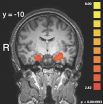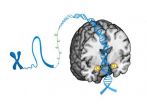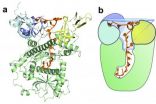(Press-News.org) Cancer Research UK scientists have found a new use for an old drug by showing that it shrinks a particular type of pancreatic cancer tumour and stops it spreading, according to research published in Gut*.
"It's a crucial step forward in developing new treatments for this devastating disease..." - Dr Jennifer Morton, study author
The scientists, at the Cancer Research UK Beatson Institute and the University of Glasgow, treated mice with pancreatic cancers caused by known genetic faults with the drug rapamycin**.
Previous clinical trials did not find this drug to be effective as a treatment for pancreatic cancers when it was given to all patients with different forms of the disease.
But the team's findings show that a particular type of pancreatic tumour – caused by a fault in the gene PTEN, which is involved in cell growth – may be responsive to the drug after all.
They found that giving rapamycin to mice with faulty PTEN pancreatic tumours stopped the cancer cells from spreading. In some cases the drug also caused the tumour to shrink.
The drug blocks a protein called 'mammalian target of rapamycin' (mTOR), which also controls cell growth. The research suggests that tumours caused by the faulty PTEN gene may be dependent on mTOR to keep growing.
And in an analysis of a sample of human pancreatic tumours the team found that around one in five carried a faulty PTEN gene, giving hope that a substantial number of patients could benefit from treatment with rapamycin.
Study author, Dr Jennifer Morton, a scientist at the Cancer Research UK Beatson Institute, University of Glasgow, said: "This is incredibly important research showing for the first time that there's potential to tailor treatment to pancreatic cancer patients based on differences in their tumour's genetic fingerprint.
"Although it's at a very early stage, it's the first time we've been able to pinpoint a genetic fault in pancreatic cancers and match it up with a specific drug.
"While more research is needed to see if this approach could benefit patients, it's a crucial step forward in developing new treatments for this devastating disease which has seen no survival improvements since the 70s."
The scientists also used a new type of imaging to help them see if the drug was working early on in the treatment, which may help doctors in the future monitor if the patient is responding.
Every year 8,800 people are diagnosed with pancreatic cancer in the UK. Just over three per cent of people diagnosed with the disease will survive for five years or more.
Dr Kat Arney, science communications manager at Cancer Research UK, said: "This is a promising step towards being able to understand how pancreatic tumours differ from each other and how we can personalise treatments to them. It's a challenging disease where little progress has been made and that's why Cancer Research UK is making pancreatic cancer a research priority.
"Over the next few years we plan to more than double the amount we spend on pancreatic cancer research to accelerate research into understanding the biology of this disease and change the odds for patients."
INFORMATION:
For media enquiries please contact the press office on 020 3469 8300 or, out-of-hours, the duty press officer on 07050 264 059.
References
* Morran DC et al. Targeting mTOR dependency in pancreatic cancer (2014) Gut. doi: 10.1136/gutjnl-2013-306202
Notes to Editor
**The drug was either given alone or in combination with the standard treatment for the disease, gemcitabine.
New trick for 'old' drug brings hope for pancreatic cancer patients
2014-08-04
ELSE PRESS RELEASES FROM THIS DATE:
Primary care telephone triage does not save money or reduce practice workload
2014-08-04
Demand for general practice appointments is rising rapidly, and in an attempt to deal with this, many practices have introduced systems of telephone triage. Patients are phoned by a doctor or nurse who either manages the problem on the phone, or agrees with the patient whether and how urgently they need to be seen.
A new large study, published in The Lancet on 4 August 2014 and funded by the UK National Institute for Health Research (NIHR), has investigated the potential value of telephone triage for patients and for the NHS. It concluded that patients who receive a telephone ...
Tumor suppressor mutations alone don't explain deadly cancer
2014-08-03
Although mutations in a gene dubbed "the guardian of the genome" are widely recognized as being associated with more aggressive forms of cancer, researchers at the University of California, San Diego School of Medicine have found evidence suggesting that the deleterious health effects of the mutated gene may in large part be due to other genetic abnormalities, at least in squamous cell head and neck cancers.
The study, published online August 3 in the journal Nature Genetics, shows that high mortality rates among head and neck cancer patients tend to occur only when mutations ...
Atlantic warming turbocharges Pacific trade winds
2014-08-03
New research has found rapid warming of the Atlantic Ocean, likely caused by global warming, has turbocharged Pacific Equatorial trade winds. Currently the winds are at a level never before seen on observed records, which extend back to the 1860s.
The increase in these winds has caused eastern tropical Pacific cooling, amplified the Californian drought, accelerated sea level rise three times faster than the global average in the Western Pacific and has slowed the rise of global average surface temperatures since 2001.
It may even be responsible for making El Nino events ...
Uncovering the 3-D structure of a key neuroreceptor
2014-08-03
Neurons are the cells of our brain, spinal cord, and overall nervous system. They form complex networks to communicate with each other through electrical signals that are carried by chemicals. These chemicals bind to structures on the surface of neurons that are called neuroreceptors, opening or closing electrical pathways that allow transmission of the signal from neuron to neuron. One neuroreceptor, called 5HT3-R, is involved in conditions like chemotherapy-induced nausea, anxiety, and various neurological disorders such as schizophrenia. Despite its clinical importance, ...
Fault trumps gruesome evidence when it comes to punishment
2014-08-03
Issues of crime and punishment, vengeance and justice date back to the dawn of human history, but it is only in the last few years that scientists have begun exploring the basic nature of the complex neural processes in the brain that underlie these fundamental behaviors.
Now a new brain imaging study – published online Aug. 3 by the journal Nature Neuroscience – has identified the brain mechanisms that underlie our judgment of how severely a person who has harmed another should be punished. Specifically, the study determined how the area of the brain that determines ...
Small DNA modifications predict brain's threat response
2014-08-03
DURHAM, N.C. -- The tiny addition of a chemical mark atop a gene that is well known for its involvement in clinical depression and posttraumatic stress disorder can affect the way a person's brain responds to threats, according to a new study by Duke University researchers.
The results, which appear online August 3 in Nature Neuroscience, go beyond genetics to help explain why some individuals may be more vulnerable than others to stress and stress-related psychiatric disorders.
The study focused on the serotonin transporter, a molecule that regulates the amount of ...
Knowing what to keep and what to trash: How an enzyme distinguishes cellular messages
2014-08-03
Cold Spring Harbor, NY – Every once in a while, we are forced to sort that stack of papers on the kitchen counter. Interspersed between the expired coupons and dozens of takeout menus are important documents like your car insurance or electric bill. So it isn't an option to simply drop it all in the trash at once – you need to read through the messages to be sure that you don't lose vital information.
In the cell, proteins similarly read through messages to distinguish what needs to be saved and what needs to be discarded. But, here, the process takes on a much more ...
Atlantic origin of recent Pacific trade wind, sea level and temperature trends
2014-08-03
An Australian–US team of climate researchers has solved a puzzle that has challenged scientists for over a decade. Climate models predict that the equatorial Pacific trades should weaken with increasing greenhouse gases. Yet, since the early 1990s, satellites and climate stations reveal a rapid and unprecedented strengthening of the Pacific trade winds, accelerating sea level rise in the western Pacific and impacting both Pacific and global climate.
"The answer to the puzzle is that recent rapid Atlantic Ocean warming has affected climate in the Pacific," say the scientists. ...
Self-assembling anti-cancer molecules created in minutes
2014-08-03
Researchers have developed a simple and versatile method for making artificial anti-cancer molecules that mimic the properties of one of the body's natural defence systems.
The chemists, led by Professor Peter Scott at the University of Warwick, UK, have been able to produce molecules that have a similar structure to peptides which are naturally produced in the body to fight cancer and infection.
Published in Nature Chemistry, the molecules produced in the research have proved effective against colon cancer cells in laboratory tests, in collaboration with Roger Phillips ...
Study finds new genetic risk markers in pancreatic cancer
2014-08-03
BOSTON –– A large DNA analysis of people with and without pancreatic cancer has identified several new genetic markers that signal increased risk of developing the highly lethal disease, report scientists from Dana-Farber Cancer Institute.
The markers are variations in the inherited DNA code at particular locations along chromosomes. Several of these variations in the DNA code were identified that influence an individual's risk for pancreatic cancer.
The discovery of these markers – along with four that were previously identified is important for several reasons, said ...





